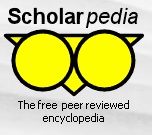Eugene M. Izhikevich, a Senior Fellow in Theoretical Neurobiology at The Neurosciences Institute in San Diego, wants to see if academics can collaborate to produce a peer reviewed equivalent to Wikipedia. The attempt is Scholarpedia, a free peer reviewed encyclopedia, entirely open to public contributions but with editorial oversight by experts.
 At first, this sounded to me a lot like Larry Sanger’s Citizendium project, which will attempt to add an expert review layer to material already generated by Wikipedia (they’re calling it a “progressive fork” off of the Wikipedia corpus). Sanger insists that even with this added layer of control the open spirit of Wikipedia will live on in Citizendium while producing a more rigorous and authoritative encyclopedia.
At first, this sounded to me a lot like Larry Sanger’s Citizendium project, which will attempt to add an expert review layer to material already generated by Wikipedia (they’re calling it a “progressive fork” off of the Wikipedia corpus). Sanger insists that even with this added layer of control the open spirit of Wikipedia will live on in Citizendium while producing a more rigorous and authoritative encyclopedia.
It’s always struck me more as a simplistic fantasy of ivory tower-common folk détente than any reasoned community-building plan. We’ll see if Walesism and Sangerism can be reconciled in a transcendent whole, or if intellectual class warfare (of the kind that has already broken out on multiple occasions between academics and general contributors on Wikipedia) — or more likely inertia — will be the result.
The eight-month-old Scholarpedia, containing only a few dozen articles and restricted for the time being to three neuroscience sub-fields, already feels like a more plausible proposition, if for no other reason than that it knows who its community is and that it establishes an unambiguous hierarchy of participation. Izhikevich has appointed himself editor-in-chief and solicited full articles from scholarly peers around the world. First the articles receive “in-depth, anonymous peer review” by two fellow authors, or by other reviewers who measure sufficiently high on the “scholar index.” Peer review, it is explained, is employed both “to insure the accuracy and quality of information” but also “to allow authors to list their papers as peer-reviewed in their CVs and resumes” — a marriage of pragmaticism and idealism in Mr. Izhikevich.
After this initial vetting, the article is officially part of the Scholarpedia corpus and is hence open to subsequent revisions and alterations suggested by the community, which must in turn be accepted by the author, or “curator,” of the article. The discussion, or “talk” pages, familiar from Wikipedia are here called “reviews.” So far, however, it doesn’t appear that many of the approved articles have received much of a public work-over since passing muster in the initial review stage. But readers are weighing in (albeit in modest numbers) in the public election process for new curators. I’m very curious to see if this will be treated by the general public as a read-only site, or if genuine collaboration will arise.
It’s doubtful that this more tightly regulated approach could produce a work as immense and varied as Wikipedia, but it’s pretty clear that this isn’t the goal. It’s a smaller, more focused resource that Izhikevich and his curators are after, with an eye toward gradually expanding to embrace all subjects. I wonder, though, if the site wouldn’t be better off keeping its ambitions concentrated, renaming itself something like “Neuropedia” and looking simply to inspire parallel efforts in other fields. One problem of open source knowledge projects is that they’re often too general in scope (Scholarpedia says it all). A federation of specialized encyclopedias, produced by focused communities of scholars both academic and independent — and with some inter-disciplinary porousness — would be a more valuable, if less radical, counterpart to Wikipedia, and more likely to succeed than the Citizendium chimera.
if:book
A Project of the Institute for the Future of the Book
